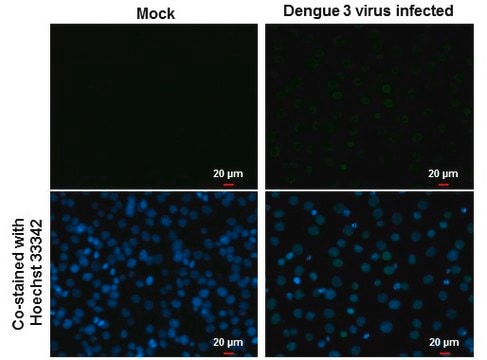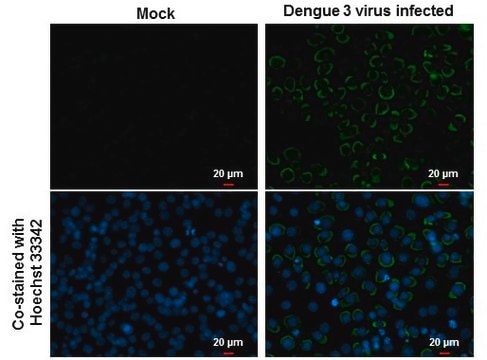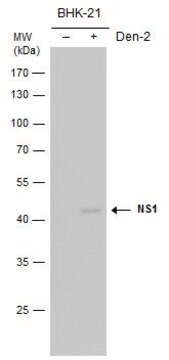MAB8705
Anti-Dengue Virus Complex Antibody, clone D3-2H2-9-21
clone D3-2H2-9-21, Chemicon®, from mouse
Bejelentkezésa Szervezeti és Szerződéses árazás megtekintéséhez
Összes fotó(1)
About This Item
UNSPSC kód:
12352203
eCl@ss:
32160702
NACRES:
NA.41
Javasolt termékek
biológiai forrás
mouse
Minőségi szint
antitest forma
purified immunoglobulin
klón
D3-2H2-9-21, monoclonal
faj reaktivitás
human
gyártó/kereskedő neve
Chemicon®
technika/technikák
immunocytochemistry: suitable
immunofluorescence: suitable
izotípus
IgG2a
kiszállítva
wet ice
Általános leírás
Dengue fever is an acute, mosquito-transmitted viral disease characterized by fever, headache, arthralgia (severe retro-orbital pain), myalgia, rash, nausea, and vomiting. Infections are caused by any of the four closely related, but antigenically distinct virus serotypes (DEN-1, DEN-2, DEN-3, and DEN-4). Infection with one of these serotypes does not provide cross-protective immunity, so persons living in a dengue-endemic area can have four dengue infections during their lifetimes. Dengue is primarily an urban disease of the tropics, and the viruses that cause it are maintained in a cycle that involves humans and Aedes aegypti, a domestic, day-biting mosquito that prefers to feed on humans. Although most dengue infections result in relatively mild illness, some can produce Dengue Hemorrhagic Fever (DHF) or dengue shock syndrome, with children being particularly at risk. Although epidemic outbreaks have been reported since 1779, the incidence has been increasing, with global, multiple serotype pandemics intensifying within the last 15 years. There is no specific antiviral therapy for dengue, but for both classical dengue and dengue hemorrhagic fever, symptomatic and supportive measures are effective. Important risk factors for DHF include the strain and serotype of the virus involved, as well as the age, immune status, and genetic predisposition of the patient.
Egyediség
Reacts with all members of the Dengue complex.
Immunogen
Dengue type 4 virus antigens.
Alkalmazás
Detect Dengue Virus Complex using this Anti-Dengue Virus Complex Antibody, clone D3-2H2-9-21 validated for use in IC & IF.
Immunofluorescence.
Immunocytochemistry on acetone fixed material.
Suggested working dilution: 1:50-400.
Final working dilutions must be determined by end user.
Immunocytochemistry on acetone fixed material.
Suggested working dilution: 1:50-400.
Final working dilutions must be determined by end user.
Research Category
Infectious Diseases
Infectious Diseases
Research Sub Category
Infectious Diseases - Viral
Infectious Diseases - Viral
Fizikai forma
Format: Purified
Protein A Purified mouse immunoglobulin in 20 mM sodium phosphate, 250 mM NaCl, pH. 7.6, with 0.1% sodium azide as a preservative.
Protein A purified
Tárolás és stabilitás
Maintain for 6 months at 2–8°C from date of shipment. Aliquot to avoid repeated freezing and thawing. For maximum recovery of product, centrifuge the original vial after thawing and prior to removing the cap.
Analízis megjegyzés
Control
Dengue positive patient sample
Dengue positive patient sample
Egyéb megjegyzések
Concentration: Please refer to the Certificate of Analysis for the lot-specific concentration.
Jogi információk
CHEMICON is a registered trademark of Merck KGaA, Darmstadt, Germany
Jogi nyilatkozat
Unless otherwise stated in our catalog or other company documentation accompanying the product(s), our products are intended for research use only and are not to be used for any other purpose, which includes but is not limited to, unauthorized commercial uses, in vitro diagnostic uses, ex vivo or in vivo therapeutic uses or any type of consumption or application to humans or animals.
Tárolási osztály kódja
12 - Non Combustible Liquids
WGK
WGK 2
Lobbanási pont (F)
Not applicable
Lobbanási pont (C)
Not applicable
Analitikai tanúsítványok (COA)
Analitikai tanúsítványok (COA) keresése a termék sarzs-/tételszámának megadásával. A sarzs- és tételszámok a termék címkéjén találhatók, a „Lot” vagy „Batch” szavak után.
Már rendelkezik ezzel a termékkel?
Az Ön által nemrégiben megvásárolt termékekre vonatkozó dokumentumokat a Dokumentumtárban találja.
Modulation of ?-enolase post-translational modifications by dengue virus: increased secretion of the basic isoforms in infected hepatic cells.
Higa, LM; Curi, BM; Aguiar, RS; Cardoso, CC; De Lorenzi, AG; Sena, SL; Zingali, RB; Da Poian, AT
Testing null
Laura B Dickson et al.
Science advances, 3(8), e1700585-e1700585 (2017-08-25)
Conditions experienced during larval development of holometabolous insects can affect adult traits, but whether differences in the bacterial communities of larval development sites contribute to variation in the ability of insect vectors to transmit human pathogens is unknown. We addressed
Antibody neutralization and viral virulence in recurring dengue virus type 2 outbreaks.
Sook-San Wong,Juraina Abd-Jamil,Sazaly Abubakar
Viral Immunology null
Lorena O Fernandes-Siqueira et al.
mSphere, 3(1) (2018-02-07)
Dengue virus (DENV) is among the most important human arboviruses and is clinically and experimentally associated with lipid metabolism disorders. Using high-resolution respirometry, we analyzed the metabolic switches induced by DENV in a human hepatic cell line. This experimental approach
NF90 binds the dengue virus RNA 3' terminus and is a positive regulator of dengue virus replication.
Raúl C Gomila et al.
PloS one, 6(2), e16687-e16687 (2011-03-10)
Viral RNA translation and replication are regulated by sequence and structural elements in the 5' and 3' untranslated regions (UTR) and by host cell and/or viral proteins that bind them. Dengue virus has a single-stranded RNA genome with positive polarity
Tudóscsoportunk valamennyi kutatási területen rendelkezik tapasztalattal, beleértve az élettudományt, az anyagtudományt, a kémiai szintézist, a kromatográfiát, az analitikát és még sok más területet.
Lépjen kapcsolatba a szaktanácsadással






